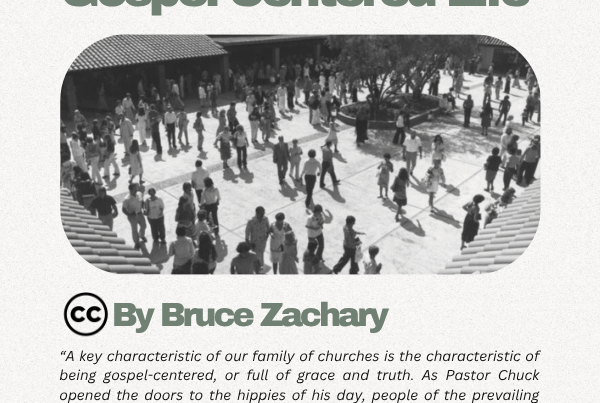
Just when people started coming back to church… Omicron. How many more Greek letters will we go through? As a pastor of a local Church, I’m concerned about the social implications on fellowship. Since the beginning of the pandemic, through technology, we can be close while keeping our distances. If we miss the worship service, we can fill our homes with an atmosphere of positivity by streaming albums or videos produced by world-class musicians. Also, there are millions of podcasts, e-books, audiobooks, and sermon audios and videos to keep our minds occupied with wholesome thoughts. What a blessing for those who are quarantined, who have a newborn at home, or are immunocompromised.
That being said, the effects are not all positive, as the studies of increased loneliness1 and statistics on violence2 can attest. It would appear that our generation has been granted a view into the effects of a technological Church over against a live meeting of the sanctified imperfect. The new situation has provided the type of experience where no one has to be offended, where the illusion of closeness lasts the length of a video that I can pause or choose not to show my face. It’s reminiscent of the pure, sharp, cold lines of modern architecture. Or to quote French Philosopher Jacques Ellul: “All this not only sterilises the intervention, but institutes a false relationship to a false real. I take for reality what is shown to me, and reality fades away.”3 This to me seems to be one of the more silent dangers, a loss of what’s real to what’s pictured, presented, and downloaded. A sterilised or homogenised version of what should be life changing—meeting God in the assembly.
So I’d like to ask myself and my readers, why do we need community? Is it truly necessary for our Christian experience? Before I begin to worry those who know me, I’ll state bluntly my position. Yes! I believe in the Church. I believe in fellowship and the need to meet in person with other believers, and I’ll limit my arguments to only five.
Community is part of Creation.
To begin, we need community because it is part of Creation. As God placed man in the garden to cultivate it and have dominion over creation (Gn 1:26-27; 2:18-20), He said, “It is not good that man should be alone” (Gn 2.18). The Lord then proceeded to create the woman as a helper. This was to be the beginning of culture, a series of relationships that was destined to be “a place of human flourishing.”4 It can be argued that God’s intention to meet man’s need was found in the marriage relationship in Genesis 2:18 and not the Church. Certainly, the immediate text would support this, as would the fact that no New Testament author cites this as a reason for community. But I would respond that within the Cultural Mandate to cultivate wholesome relationships through a generous stewardship of what God created for man’s care is an implicit design that humans aren’t made to live alone. I would also point to the fact that the English word we use for “church” is our translation for ἐκκλησία, “an assembly or gathering of people.”
Community helps us understand biblical covenantal relationships.
Closely tied to the last point, we need community because it helps us understand biblical, covenantal relationships. In our day, the word “friend” has come to mean anything from an acquaintance, to a marriage partner, to a digital name I can block whenever I no longer agree with their opinion. I’m convinced that most understand the varying degrees of friendship and commitment, but I wonder what the devaluation of the term has produced in relationships. When we consider the covenantal ceremonies in the Bible, like the one the Lord celebrated with Abram in Genesis 15:9-21, or the Lord’s supper in Matthew 26:20-29, we can read a permanence lasting throughout a lifetime. Although these are covenants concluded between God and man, the impact outlasted the lifetime of those men with whom God interacted. In both cases, the men involved were called friends (Gn 15:6; 2Chr 20:7; Is 41:8; Jn 15:15).
Before I get too far off subject, let me underline two observations: a friendship involves cooperation and togetherness. In the covenantal relationships, each one has a part. God gave blessings and promises, while Abraham believed and received. The Lord Jesus laid down His life, while we believe and receive today. Cooperation.
As for togetherness, both covenants involve two parties closely knit together. Is this not what we see in Paul’s description of the Church and its use of Spiritual Gifts in 1 Corinthians 12-14? The Church made of members so tight that Paul describes them as parts of a same body, working in harmony, and in a sense, the many become one. This is impossible to learn alone watching a screen or singing with Siri or Alexa. Although the nearness of God can be experienced, the full sense of community cannot.
Community helps us understand ourselves.
In a very similar way, we need community because it helps us understand ourselves. C.S Lewis spoke of this in The Four Loves. He wrote: “In each of my friends there is something that only some other friend can fully bring out. By myself I am not large enough to call the whole man into activity; I want other lights than my own to show all his facets.”5 His idea was that as we get to know another person, we find common interests and loves, perhaps discover new ones. We enter a conversation that becomes unique to the relationship that is felt as a true loss when the person is gone. In the same way, someone with a spiritual gift of administration needs a community of people with organisational needs, a teacher must have students, and someone who speaks in tongues during the service needs an interpreter. It’s much like a dance. As we move our feet to the music, we discover if we can feel the rhythm. As we hold our partner’s hand, we learn if we can lead fluidly or tend to step on toes. In this way, as applied to using our spiritual gifts in fellowship, we discover our unique place in the body of Christ.
Community helps us know God.
This brings me to another idea—we need community because it helps us know God. Church isn’t only about the sermon or the worship. We learn about God as we eat the bread and drink the cup, just as we do while watching a new believer baptised. But there are some things we can only learn about God while we are in relationship with other believers. It’s part of being created in His image and having that image restored through the New Birth. As I serve with a sister who has a different gift than I, she shows me how God works in ways I wouldn’t otherwise have known. It’s in her response, her gifts that I don’t posses. In the same way, I learn about God as a brother ministers to me or prays for my needs. More that just a perspective, it’s God working through him, so that if given eyes to see, I learn more about God than a simple transfer of information I can read in a book. I’m speaking of an experiential knowledge: observable, palpable or, to borrow a phrase from theologian John Frame, “to know God is friendship.”
The Bible imperatively demands community.
Lastly, we need community because the Bible imperatively demands it. Hebrews 10:25, probably one of the most quoted verses on the subject, says, “Not forsaking the assembling of ourselves together, as is the manner of some, but exhorting one another, and so much the more as you see the Day approaching.” As far as a lexical prooftext, we almost have an airtight case with this one. Note that the word translated “the assembling of ourselves,” ἐπισυναγωγή (a word composed of ἐπι—on + συν—with + αγω—to bring or lead), is the same word used in “the gathering together to the Lord” at His return in 1 Thessalonians 2:1.
This clear exhortation to persevere in meeting together is actually part of a much bigger thought. It’s the imperative to a powerful indicative statement, meaning it’s the application of what we’ve been given in Jesus (Hb 10:19-21). Because we have boldness to enter into the Holy Place (v19a), because Christ was the sacrifice that opened the way (v19b-20), and because He is the Great High Priest over the house of God (v21), we should not abandon the assembly. So in the end, meeting together is a vibrant and life-giving privilege that comes from above. It originates in what Jesus accomplished for us and translates into an act of worship.
NOTES
1 Hwang, Tzung-Jeng, Kiran Rabheru, Carmelle Peisah, William Reichman, and Manabu Ikeda. “Loneliness and Social Isolation during the COVID-19 Pandemic: International Psychogeriatrics.” Cambridge Core. Cambridge University Press, May 26, 2020.
2 Stripe, Nick. “Domestic Abuse during the Coronavirus (COVID-19) Pandemic, England and Wales: November 2020.” Domestic abuse during the coronavirus (COVID-19) pandemic, England and Wales – Office for National Statistics. Office for National Statistics, November 25, 2020.
3 Jacques Ellul, La parole humiliée, (Paris: La Table Ronde, 1981, réédition 2020), 229.
Personal translation of the original: “Tout cet ensemble non seulement stérilise l’intervention, mais institue une fausse relation à un faux réel. Je prends pour réalité ce qui m’est montré, et le réel s’efface.”
4 I borrow this phrase from Andy Crouch who uses it often in his written work.
5 C.S. Lewis, The Four Loves, (New York: Harcourt, Brace, 1960), 92, Digital Copy.









